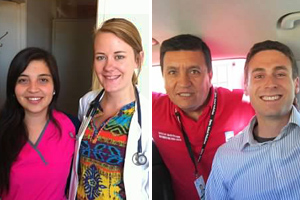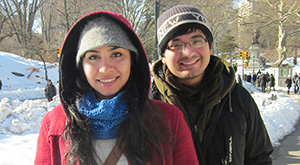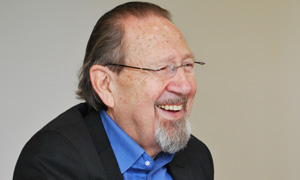

Exchanging Viewpoints
Students Learn, Share Lessons South and North of the Equator
Sometimes the route to a medical degree follows a lengthy path. In the case of Caitlin Schrepel and Eric Tanenbaum, who will begin their fourth year at Einstein this fall, that path has already taken them more than 5,000 miles from New York, to South America.

Einstein’s Caitlin with a staff member of a local Chilean clinic; her classmate Eric Tanenbaum en route to clinic siteThe students recently returned to the Bronx following nearly a year of service and research in Chile, taking part in an exchange program with the Autonomous University of Chile (Universidad Autónoma de Chile) that is now in its fourth year. The duo made their trip with support from Einstein's Global Health Fellowship program, established 30 years ago by Dr. Albert Kuperman, associate dean emeritus for educational affairs. Today, nearly 100 Einstein medical students travel abroad each year to learn in numerous locations, including Uganda, Ethiopia, and Guatemala.
Pioneers of a New Program
Unlike many other global health fellows, who typically work and study in foreign countries over a summer or for a couple of months, these students chose to postpone their studies at Einstein by making a 10-month commitment to family medicine, primary care and public health research in Chile.
"Caitlin and Eric are real pioneers," said Jill Raufman, current director of the Global Health Fellowship program "And they're a credit to the legacy of Dr. Kuperman, and Dr. Belmar."
"Dr. Belmar" is Roberto Belmar, M.D., senior advisor of Chile's Ministry of Health under President Michelle Bachelet, where he oversees public health for the 6 million residents of Chile's capital city, Santiago. Dr. Belmar fled the country during its 1973 military coup, in the face of an order for his execution. After obtaining political asylum in the United States, he taught at Einstein and served at Montefiore Medical Center.
Upon returning to Chile in 1985, Dr. Belmar became chief of Chile's public health service and was instrumental in instituting the country's "Statute of Primary Care," which guarantees basic medical services to all citizens by establishing health as a human right and free of charge for all inhabitants of Chile. More recently, he is author of a book, A Primary Health Care Model for the Americas, and has worked with Einstein to create the Chilean fellowship.
It was Dr. Belmar, traveling frequently between Santiago and New York, who motivated Ms. Schrepel and Mr. Tanenbaum to consider heading south.
"We met with him, we talked a lot, and it just seemed like a great opportunity," said Ms. Schrepel. "He was inspiring."
Expanding Their Educational Horizons

Chilean medical students Antonieta Valenzuela and Marcelo Garrido experienced snow for the first time while at Einstein"I knew when I came to Einstein that I wanted to spend time overseas," said Ms. Schrepel, who majored in anthropology at the University of Colorado and is interested in emergency medicine. "Just living in a different culture can be a great education in itself."
Mr. Tanenbaum, an environmental health graduate of the University of Washington, said, "I wasn't able to study abroad during college, and I felt it would be an important part of my medical education. Plus, I spoke a little Spanish."
Indeed, understanding the language of Chile proved to be one of the major challenges for the students. Mr. Tanenbaum's fluency was truly tested, while Ms. Schrepel had no knowledge of the language before her fellowship.
The Benefits of Being Bilingual
"For the first few months, we had serious trouble communicating," said Mr. Tanenbaum. "But people were willing to talk with us even though the Chilean slang and accent were tough for us to master."
Both students agree that being able to converse in "medical Spanish" is critical to patient care, in the Bronx as well as in Chile, and in other parts of the United States.
"You want patients to be 100 percent comfortable, and that means being able to understand where they're coming from, and being able to speak their language," said Mr. Tanenbaum, who plans to pursue internal medicine.
Understanding Cultural Influences
He and Ms. Schrepel worked and learned in Talca, a city of 200,000 about 160 miles south of Santiago, as well as in the smaller city of Linares and the rural town of Curanipe. The experience of being in such diverse communities was part of the education, according to Mr. Tanenbaum.
Unlike developing countries where global health students often venture, Chile supports an advanced healthcare system in which 90 percent of the population is covered by medical insurance, and average life expectancy is greater than that of the United States.

Roberto Belmar, M.D.Still, many Chileans, especially in rural areas, are skeptical of modern medicine and adhere to traditional folk cures.
"It was surprising to realize how many people there don't take medication for chronic diseases, like diabetes," said Mr. Tanenbaum.
The students conducted a survey of how Chileans obtain primary care, which, according to Dr. Belmar, offers an important contribution toward the improvement of rural primary care and Chile's plan offering Universal Access with Explicit Guarantees, known as AUGE. The study also provided a valuable learning experience that will inform future global health research conducted by Einstein students in Chile, noted to Ms. Raufman.
More importantly, the exchange program allows Einstein students to get a firsthand understanding of medicine under a healthcare system that is similar to healthcare in the U.S., in spite of different models of implementation.
Gaining Perspective of Healthcare in the U.S.
The same can be said for the students from south of the equator who come to Einstein for the month of February to live and learn. As part of the exchange program, Einstein hosted fifth-year medical students Marcelo Garrido and Antonieta Valenzuela, from the Autonomous University.
While attending Einstein family medicine classes and participating in the Einstein Community Health Outreach Free Clinic, the two noted some differences between healthcare in their homeland and what they observed in New York, including the prevalent use of technology and the lack of health insurance in the United States. The interaction among patients, physicians, and students was also a pleasant surprise.
"The doctors here know all about the patients," said Ms. Valenzuela, who plans to enter family medicine. "The doctor could come in, read the name on the file and tell us the history before the patient even came in. It was really great."
Mr. Garrido, who is interested in public health policy, added, "In Chile, the doctor's contract doesn't leave a lot of hours to talk with students or residents. The amount of feedback time that you have here is so much more than we have … we were amazed."
This ability to understand the differences in medicine from different hemispheres is one of the values of the fellowship, according to Dr. Belmar, and one that is mutually beneficial. "The interchange between our institutions allows us to see that the essential mandate of health is similar in different societies," he noted.
"Our students come to Einstein and Einstein students come to us, and they see that we share the same ideals and principles with an institution so far away. They come to realize that we may have differences in terms of resources, but we have the same respect for the patient and for the need to serve. And these are values we would like to reinforce with our students."
Posted on: Wednesday, August 6, 2014


